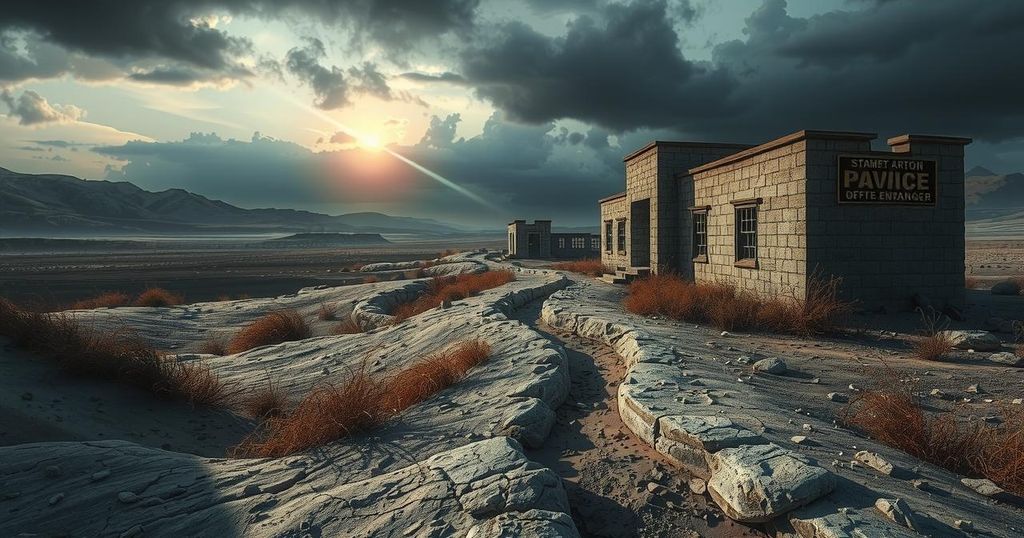The DRC is engulfed in a severe resurgence of violence led by the M23 rebel group, prompting international concern over the humanitarian crisis and geopolitical stability. With significant mineral wealth at stake, the situation demands urgent attention as regional tensions escalate, intensified by Rwanda’s involvement and the contrasting responses from global powers. This conflict threatens to destabilize not only the DRC but also has far-reaching implications for global supply chains and regional politics.
A resurgence of conflict in the Democratic Republic of Congo (DRC), fueled by the M23 rebel group, has sparked deadly clashes and significant displacement. M23 aims to expand its territory southward from Goma, posing a threat to the already fragile state of peace in a region known for decades of violent strife. Following M23’s recent territorial gains, including control over Goma, President Félix Tshisekedi pledged to reclaim every part of Congolese territory.
The DRC, rich in valuable minerals essential for global technology, has experienced a surge in violence, exacerbated by external influences and internal strife. Over 400,000 individuals were displaced just last month, while the humanitarian crisis worsens as water and electricity services in Goma have been cut off amid rising fatalities from conflict. The nation has a long history of unrest, particularly following its independence from Belgium in 1960, with millions affected by previous wars.
Rwanda’s involvement is pivotal, with accusations of support to M23 amid the deteriorating situation. The United Nations has noted that M23’s resurgence could be perceived as Rwanda’s declaration of war against the DRC government. Notably, Western nations’ muted response to this conflict raises concerns regarding their influence in the region, providing opportunities for nations like China and Russia to expand their presence as suggested by experts in international relations.
The M23 group emerged from historical tensions involving ethnic dynamics linked to the Rwandan genocide. Comprised mainly of ethnic Tutsi, M23 claims to defend minority interests in the DRC’s Hutu-dominated socio-political landscape. Despite the past integration of some rebel factions into the Congolese army, tensions remain high, with Rwanda’s support of M23 complicating the peace landscape.
The significance of cobalt production in the DRC cannot be overstated, particularly as 80% of the mineral is controlled by Chinese firms, highlighting a complex interplay of global business interests amid ongoing conflict. China’s condemnation of M23 emphasizes the global stakes of regional stability, amid concerns about the safety of mineral supplies amid escalating violence.
Rwanda’s strategy under President Kagame has become a central focus in this renewed conflict, as international responses remain divided. While some Western nations reconsider their support towards Rwanda, the flow of aid appears largely uninterrupted, suggesting a reluctance to alter established partnerships. The conflict seems poised to persist, as M23 continues its offensive despite calls for a ceasefire and renewed diplomatic efforts to stabilize the region, creating a multidimensional crisis.
In summary, the ongoing conflict in the DRC, marked by the resurgence of the M23 group and its territorial ambitions, poses serious humanitarian and geopolitical challenges. The implications extend beyond regional borders, affecting global supply chains dependent on Congolese minerals. A cooperative international response may be crucial in addressing both the violence and the broader strategic interests at stake.
The Democratic Republic of Congo has long been a battleground, afflicted by conflict and a power struggle touching on both national and international dimensions. With a challenging history stemming back to its post-colonial era, the nation has faced numerous armed groups vying for power over a resource-rich territory. The recent emergence of M23 symbolizes a continuity of these struggles, now intricately linked to the interests of neighboring nations like Rwanda and global powers vying for mineral resources. The situation continues to escalate threatening not only regional stability but impacting the global supply chain of essential minerals, particularly cobalt, utilized in technology production worldwide.
The intensified conflict involving the M23 rebel group in the DRC reflects a complex interplay of local grievances, historical tensions, and international interest, chiefly surrounding key resources. Humanitarian crises, intensified military actions, and geopolitical strategies, appear deeply interconnected. These factors necessitate a substantive and collaborative response from the international community to address both immediate humanitarian needs and broader implications for stability in central Africa.
Original Source: www.nbcnews.com






